Politics
 In a time when our police officers are being randomly attacked, I think it is important to remember just who it is that comes running in to protect those in need of assistance. Police officers have such a complicated job. Part of the people they come in contact with are in need of their assistance, and when they are, they are grateful for the help. The other part of the people are the criminal side, and they are the ones, of course, who hate the cops. And unfortunately, sometimes the lines get very blurred. There are people in need of help, but they don’t want that help, and those who the cops are arresting or giving a ticket to, who then steps in the assist the very police officer who was arresting them. Those situations are really quite surprising…amazingly so.
In a time when our police officers are being randomly attacked, I think it is important to remember just who it is that comes running in to protect those in need of assistance. Police officers have such a complicated job. Part of the people they come in contact with are in need of their assistance, and when they are, they are grateful for the help. The other part of the people are the criminal side, and they are the ones, of course, who hate the cops. And unfortunately, sometimes the lines get very blurred. There are people in need of help, but they don’t want that help, and those who the cops are arresting or giving a ticket to, who then steps in the assist the very police officer who was arresting them. Those situations are really quite surprising…amazingly so.
Nevertheless, I can see how being a police officer would be a difficult occupation. When the good guys can turn into the bad guys, and the bad guys can turn into the good guys, it creates a situation whereby an officer just doesn’t know what to expect going into any situation. Still, they go into those situations, knowing the possible perils, but knowing too that the work they do is important.
Many people don’t really give much thought to the life of a police officer, but when you have two of them in your very close family, you just naturally feel differently about them. You know their hearts and you know their level of integrity. They aren’t just a random police officer, but rather, they are family, and you love them. That is the situation in my family. We have two police officers in our midst. Leutenant Chris Hadlock, of the Casper Police Department, and State Trooper Jason Sawdon of the Wyoming Highway  Patrol, are both exceptional officers. I’m sure that is why my family and I take personal offense when someone decides that police officers are not important. There are many times when any of us could be in a really bad place, were it not for a police officer. So the next time you are stopped for speeding, and you are tempted to be angry about it, remember…you were speeding, and they officer is just doing his or her job. Any time we break the law, we are a risk for others…people, just like us, who that officer has sworn an oath to protect. Swallow that anger, and take your medicine. You deserve it. Today is a day to honor our police officers. Thank you Chris and Jason, and the officers in the Casper area and the nation. We appreciate your service. Police lives matter. Thank a police officer today.
Patrol, are both exceptional officers. I’m sure that is why my family and I take personal offense when someone decides that police officers are not important. There are many times when any of us could be in a really bad place, were it not for a police officer. So the next time you are stopped for speeding, and you are tempted to be angry about it, remember…you were speeding, and they officer is just doing his or her job. Any time we break the law, we are a risk for others…people, just like us, who that officer has sworn an oath to protect. Swallow that anger, and take your medicine. You deserve it. Today is a day to honor our police officers. Thank you Chris and Jason, and the officers in the Casper area and the nation. We appreciate your service. Police lives matter. Thank a police officer today.
 The Constitution has been in the news a lot these days, or shall I say, the violation of the Constitution. Sometimes I wonder if the signers of the Constitution would even be able to recognize the nation that they had envisioned when they wrote the Constitution. I happen to think they would not, but then even at the signing of the Constitution there was controversy. In that way, I suppose there would always be those who would do everything in their power to change or even do away with the Constitution. At the time of the Constitutional Convention in Philadelphia, only 38 of the 41 delegates present at its conclusion, agreed to sign the document. There were those, even then, who disagreed with what was laid out there. I suppose that is common in anything in life. Needless to say, it was a hard-won battle to win the ratification by the necessary nine out of thirteen US states in existence at the time.
The Constitution has been in the news a lot these days, or shall I say, the violation of the Constitution. Sometimes I wonder if the signers of the Constitution would even be able to recognize the nation that they had envisioned when they wrote the Constitution. I happen to think they would not, but then even at the signing of the Constitution there was controversy. In that way, I suppose there would always be those who would do everything in their power to change or even do away with the Constitution. At the time of the Constitutional Convention in Philadelphia, only 38 of the 41 delegates present at its conclusion, agreed to sign the document. There were those, even then, who disagreed with what was laid out there. I suppose that is common in anything in life. Needless to say, it was a hard-won battle to win the ratification by the necessary nine out of thirteen US states in existence at the time.
Before the Constitution, the United States was operating under the Articles of Confederation, which was ratified several months before the British surrender at Yorktown in 1781. The Articles of Confederation and Perpetual Union were an agreement among all thirteen original states in the United States of America. Basically it was the first constitution. Even when not yet ratified, the Articles provided a system for the Continental Congress to direct the American Revolutionary War, conduct diplomacy with Europe, and deal with territorial issues and Native American relations, but it was weak in that it didn’t allow for our president, a court system, or taxation, thereby leaving us with a weaker government. Congress was also given no authority to enforce its requests to the states for troops, giving us a weaker military force. Yet, even with the proposed changes, there were those who would disagreed with the proposed new Constitution.
When the Constitutional Convention was convened on May 25, 1787, the plan had been to amend the Articles 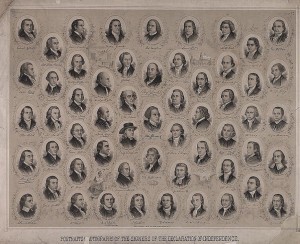 of Confederation, but that plan was quickly set aside in favor of writing a completely new Constitution. The meeting was held in Philadelphia’s Pennsylvania State House. It is now known as Independence Hall. Revolutionary War hero George Washington, a delegate from Virginia was elected as convention president. The debate was heated, but in the end, the delegates came up with a brilliant federal organization that boasted an intricate system of checks and balances. One of the main divisions in the discussions was that the more populated states wanted a state representation in Congress, and the smaller states wanted equal representation. That problem was solved by the Connecticut Compromise, which proposed a two chamber legislature with proportional representation in the lower house known as the House of Representatives and equal representation of the states in the upper house known as the Senate. It seemed a fair way to do it, but there are still those who disagree to this day.
of Confederation, but that plan was quickly set aside in favor of writing a completely new Constitution. The meeting was held in Philadelphia’s Pennsylvania State House. It is now known as Independence Hall. Revolutionary War hero George Washington, a delegate from Virginia was elected as convention president. The debate was heated, but in the end, the delegates came up with a brilliant federal organization that boasted an intricate system of checks and balances. One of the main divisions in the discussions was that the more populated states wanted a state representation in Congress, and the smaller states wanted equal representation. That problem was solved by the Connecticut Compromise, which proposed a two chamber legislature with proportional representation in the lower house known as the House of Representatives and equal representation of the states in the upper house known as the Senate. It seemed a fair way to do it, but there are still those who disagree to this day.
It would seem like they had an instant solution, but that wasn’t so. As dictated by Article VII, the document would not become binding until it was ratified by nine of the 13 states. On December 7, Delaware, Pennsylvania, New Jersey, Georgia, and Connecticut ratified the Constitution in quick succession. Other states, especially Massachusetts, opposed the Constitution, because it failed to reserve undelegated powers to the states and lacked constitutional protection of basic political rights, such as freedom of speech, religion, and the press, which I personally agree with. By February 1788, they had reached a compromise under which Massachusetts and other states would agree to ratify the document and that amendments would immediately be added to provide the protections they proposed. The Constitution was then narrowly ratified in Massachusetts. Maryland and South Carolina quickly followed. On June 21, 1788, New Hampshire became the ninth state to ratify the document, and it was agreed that government under the US Constitution would begin on March 4, 1789. In June, Virginia ratified the Constitution, followed by New York in July. The Constitution was signed on this day, September 17, 1787.
As promised, on September 25, 1789, the first Congress of the United States adopted 12 amendments to the 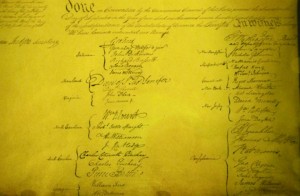 US Constitution, called the Bill of Rights. The Bill of Rights was then sent to the states for ratification. Ten of these amendments were ratified in 1791. In November 1789, North Carolina became the 12th state to ratify the US Constitution. Rhode Island, which opposed federal control of currency and was critical of compromise on the issue of slavery, resisted ratifying the Constitution until the US government threatened to sever commercial relations with the state. On May 29, 1790, Rhode Island voted by two votes to ratify the document, and the last of the original 13 colonies joined the United States. Today, the US Constitution is the oldest written constitution in operation in the world. That should say something, and it should be reason to protect it.
US Constitution, called the Bill of Rights. The Bill of Rights was then sent to the states for ratification. Ten of these amendments were ratified in 1791. In November 1789, North Carolina became the 12th state to ratify the US Constitution. Rhode Island, which opposed federal control of currency and was critical of compromise on the issue of slavery, resisted ratifying the Constitution until the US government threatened to sever commercial relations with the state. On May 29, 1790, Rhode Island voted by two votes to ratify the document, and the last of the original 13 colonies joined the United States. Today, the US Constitution is the oldest written constitution in operation in the world. That should say something, and it should be reason to protect it.
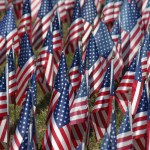 Americans are a people who have no problem speaking their minds. I suppose it all goes back to the reasons we left England in the first place. We were only allowed to believe certain things, and if we chose to be different, we could have been killed or imprisoned. It is what our nation was built on in more ways than just religion. The point was supposed to be that we were free to live our lives as we chose to, within a very few certain guidelines. For the most part, things went along smoothly…until November of 1860, when President Lincoln was elected to the presidency, that is. The people of the Deep South felt that their way of life was being threatened, in that they held slaves, and Lincoln was against slavery, as were the Northern states, or most of the people in the Northern states anyway. Of course, this whole issue brought our nation to war, a really sad thing when two sides of a nation war against each other.
Americans are a people who have no problem speaking their minds. I suppose it all goes back to the reasons we left England in the first place. We were only allowed to believe certain things, and if we chose to be different, we could have been killed or imprisoned. It is what our nation was built on in more ways than just religion. The point was supposed to be that we were free to live our lives as we chose to, within a very few certain guidelines. For the most part, things went along smoothly…until November of 1860, when President Lincoln was elected to the presidency, that is. The people of the Deep South felt that their way of life was being threatened, in that they held slaves, and Lincoln was against slavery, as were the Northern states, or most of the people in the Northern states anyway. Of course, this whole issue brought our nation to war, a really sad thing when two sides of a nation war against each other.
It is a difficult thing when so many people have such differing beliefs about the same issue. And sometimes it gets so ugly, that I have to wonder about the sanity of some people. When people burn or otherwise deface our flag, sometimes in horribly disgusting ways, or do the same to Bibles and other religious books, it is disrespectful. What I find especially disturbing is that these same people want respect for their cause or lifestyle, but they will not give the same respect for the cause or lifestyle of others. It really is a two way street. I know that a lot of people are calling for the removal of the Confederate Flag from…everywhere, but in reality it is a part of our history. We need to remember that because they lost the battle, it 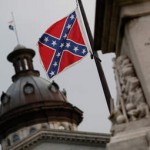 does not mean they were not brave in the fight. Lately, I have seen some shocking displays in this nation. Digging up the graves of a general and his wife, because he fought for the South, and taking shows off the air because they have a reference to a Confederate Flag in them. Political Correctness has tipped the balance of this nation to the point of insanity. It must stop, or we will have another war here. We have already had a threat of states wanting to secede from the union. It is a sad state for this great nation to be in.
does not mean they were not brave in the fight. Lately, I have seen some shocking displays in this nation. Digging up the graves of a general and his wife, because he fought for the South, and taking shows off the air because they have a reference to a Confederate Flag in them. Political Correctness has tipped the balance of this nation to the point of insanity. It must stop, or we will have another war here. We have already had a threat of states wanting to secede from the union. It is a sad state for this great nation to be in.
In the end of the Civil War, the South lost the war, the slaves were freed, and given their proper rights. No, it wasn’t the last of the battles over this issue, unfortunately, but the healing of this nation began. The eleven states that had seceded from the Union…Alabama, Florida, Georgia, Louisiana, Mississippi, South Carolina, Texas, Arkansas, North Carolina, Tennessee and Virginia, were returning one by one. Change was coming and it would slowly come to be accepted. I suppose that, as in the Civil War, the people who are fighting for their rights these days, consider the battles well worth the outcome, and maybe they are, but in many ways, we have forgotten that the people of the other side of the issue have rights too. The country was largely founded on a live and let live way of life…whether you agree with them or not. This may not be the perfect way for our nation to be, but it is as close as we can get. As with the eleven states who returned to the Union, I think it is important to consider the feeling of those who have lost the battle you felt the need to win, because in most cases, they are good people too. On this historic day, as our nation became united again, Georgia became the 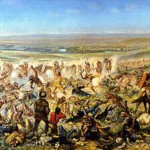 last state to be readmitted to the Union. They returned, because whether they agreed with every thing this nation stood for or not, they still knew that this was a great nation, and one they wanted to be a part of. I believe that was the case of the Cowboys and Indians. We all know that the Indians lost to the cowboys, but that does not make them any less a proud people, nor does it make them any less brave. They deserve respect, as do all the people who have lost the battles that have gone on in this nation about political correctness, policy change, or the battle of the North and South. In the words of Abraham Lincoln, “A house divided against itself cannot stand.” Whether we agree with things or disagree, we must stand united…lest we forget that the rights we take from another today, could be taken from us tomorrow.
last state to be readmitted to the Union. They returned, because whether they agreed with every thing this nation stood for or not, they still knew that this was a great nation, and one they wanted to be a part of. I believe that was the case of the Cowboys and Indians. We all know that the Indians lost to the cowboys, but that does not make them any less a proud people, nor does it make them any less brave. They deserve respect, as do all the people who have lost the battles that have gone on in this nation about political correctness, policy change, or the battle of the North and South. In the words of Abraham Lincoln, “A house divided against itself cannot stand.” Whether we agree with things or disagree, we must stand united…lest we forget that the rights we take from another today, could be taken from us tomorrow.
 With our nation’s Independence Day upon us, I find myself, like many other Americans, in a rather weary and confused state. So much about our country has changed, that it has almost become unrecognizable to me. The United States of America has always been known as the land of the free and the home of the brave, but now it seems that we are becoming the land of the free, only if we agree with what a select few want, and as for the brave, well it’s becoming very much out of style to stand up for our beliefs, values, or even for our country. I’m not picking on any one group here, but rather I find myself feeling quite sad that the sense of pride we have always felt for our nation is suddenly gone…at least in the minds of some people. I know that everyone really has a right to live their life in the way that they want to, but the problem is that lately everyone wants to tell everyone else how to believe. With that in mind, I thought it fitting to remind people about why our ancestors came here in the first place.
With our nation’s Independence Day upon us, I find myself, like many other Americans, in a rather weary and confused state. So much about our country has changed, that it has almost become unrecognizable to me. The United States of America has always been known as the land of the free and the home of the brave, but now it seems that we are becoming the land of the free, only if we agree with what a select few want, and as for the brave, well it’s becoming very much out of style to stand up for our beliefs, values, or even for our country. I’m not picking on any one group here, but rather I find myself feeling quite sad that the sense of pride we have always felt for our nation is suddenly gone…at least in the minds of some people. I know that everyone really has a right to live their life in the way that they want to, but the problem is that lately everyone wants to tell everyone else how to believe. With that in mind, I thought it fitting to remind people about why our ancestors came here in the first place.
When our forefathers left England, it was to get away from a government that made it a treasonous act to separate from the Church of England. The people who did not agree with the teachings of the Church of England had to leave or they would be killed. That was the reason that the First Amendment to our Constitution says, “Congress shall make no law respecting an establishment of religion, or prohibiting the free exercise thereof; or abridging the freedom of speech, or of the press; or the right of the people peaceably to assemble, and to petition the government for a redress of grievances.” These were very important parts of our 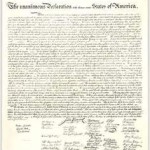 Constitution. The problem is that many people have forgotten those rights, or they have mixed up the meaning, thinking that we are not to have anything to do with religion in our government. That isn’t it at all. It says that the government is to stay out of our religious beliefs. That is not what is happening. Our current government is far too invasive in our religions.
Constitution. The problem is that many people have forgotten those rights, or they have mixed up the meaning, thinking that we are not to have anything to do with religion in our government. That isn’t it at all. It says that the government is to stay out of our religious beliefs. That is not what is happening. Our current government is far too invasive in our religions.
As time went on, England tried to usurp more and more authority over the young colonies. They tried to interfere with religion, economics, and politics. Even though we were a nation basically under them, we knew it could not continue much longer. It was decided that we needed to be independent from England. That was when we knew that we could not continue to be under this type of rule. So, why do we celebrate the 4th of July…Independence Day. We think of July 4, 1776, as a day that represents the Declaration of Independence and the birth of the United States of America as an independent nation. But it wasn’t on July 4, 1776 that the Continental Congress decided to declare independence. That was on July 2, 1776. It wasn’t the day we started the American Revolution either. That had happened back in April 1775. And it wasn’t the day Thomas Jefferson wrote the first draft of the Declaration of Independence. He did that in June 1776. It wasn’t even the date on which the Declaration was delivered to Great Britain. That didn’t happen until November 1776. It wasn’t even the date it was signed. That was August 2, 1776.
No, we celebrate the 4th of July, because that was the day that the Continental Congress approved the final 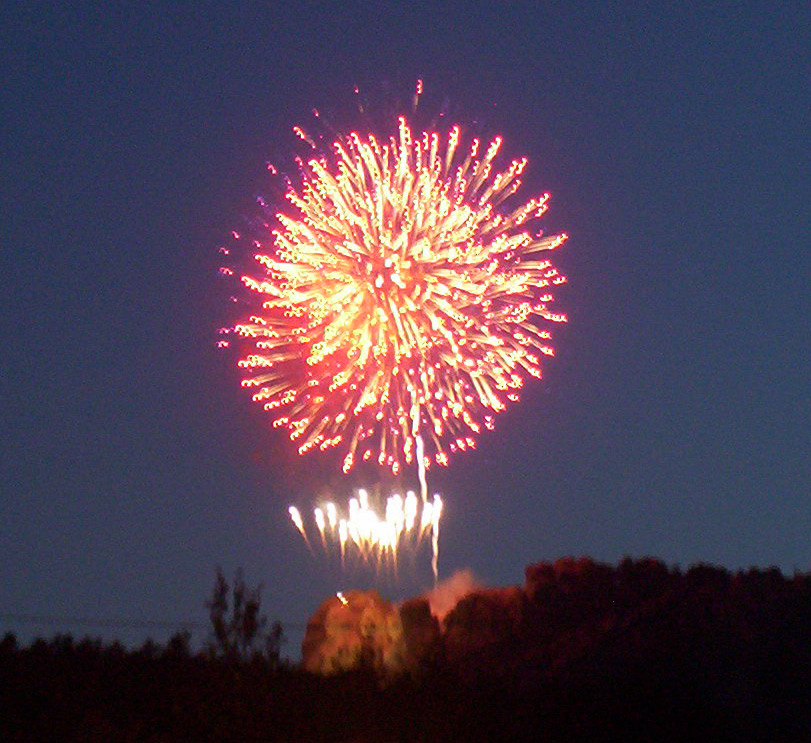 wording of the Declaration of Independence, in 1776. They’d been working on it for a couple of days after the draft was submitted on July 2nd and finally agreed on all of the edits and changes. That was the day that truly represents our Independence. Not the day it was accepted by Britain, but the day we decided to make it our own. That was the day we made freedom and independence our own. It was the day that we decided to live in peace together, with each man, woman, and child having certain rights that should never be denied them. I think some people in our country, and especially our leadership have forgotten that fact in their race to political correctness, anti-racism, and a thinly disguised attempt to control our religious rights.
wording of the Declaration of Independence, in 1776. They’d been working on it for a couple of days after the draft was submitted on July 2nd and finally agreed on all of the edits and changes. That was the day that truly represents our Independence. Not the day it was accepted by Britain, but the day we decided to make it our own. That was the day we made freedom and independence our own. It was the day that we decided to live in peace together, with each man, woman, and child having certain rights that should never be denied them. I think some people in our country, and especially our leadership have forgotten that fact in their race to political correctness, anti-racism, and a thinly disguised attempt to control our religious rights.
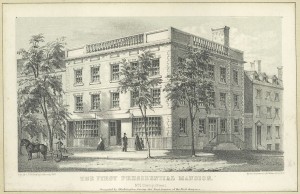
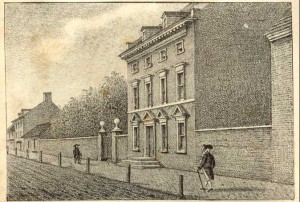 For a time it seemed that our nation couldn’t decide where to put the capitol. The first capitol…for a very short time, was New York City. President George Washington occupied two executive mansions in New York City…the Samuel Osgood House and the Alexander Macomb House. New York began building Government House, but Washington never occupied it. The capitol was moved to Philadelphia. Few people realize that it all began in New York City, nor do they realize that Philadelphia was the first official capitol of the United States. Washington DC became the capitol in December, 1800.
For a time it seemed that our nation couldn’t decide where to put the capitol. The first capitol…for a very short time, was New York City. President George Washington occupied two executive mansions in New York City…the Samuel Osgood House and the Alexander Macomb House. New York began building Government House, but Washington never occupied it. The capitol was moved to Philadelphia. Few people realize that it all began in New York City, nor do they realize that Philadelphia was the first official capitol of the United States. Washington DC became the capitol in December, 1800.
The 1790 Residence Act named Philadelphia the temporary capital for ten years untile the White House could be built on the Potomac River in what is now Washington DC. Philadelphia housed both Continental Congresses and the Constitutional Congress. Both the Declaration of Independence and the Constitution were written in Philadelphia. When it was decided that Washington DC would become the capitol, there was a bit of a fight over the move. While President Washington lived in Philadelphia, he lived in the Market Street mansion, which he altered in ways that may have influenced the White House. In an effort to keep the capitol in Philadelphia, Pennsylvania built a grand presidential mansion a few blocks from the Market Street mansion, but President Washigton declined to occupy it.
President Washington’s term would end before the White House was completed. John Quincy Adams became president and lived in the Market Street mansion from March 1797 to May 1800, having also declined to move into the grand presidential mansion that Pennsylvania had built. Then on June 3, 1800, President Adams moved to Washington DC. The White House was still not finished, so in what I found a shocking move, he moved into the Washington City Hotel, as it was properly named. It was called, and rightfully so, Tunnicliff’s, named after William Tunnicliff, who had it build, and owned it. The Washington City Hotel was in reality, a tavern. A tavern!! That is such a strange place for a US president to choose to live. I’m sure he was excited about 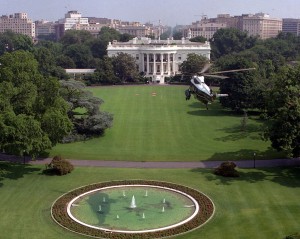
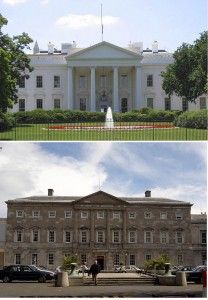 moving into the White House, but it would not be finished unto the end of October. President Adams finally moved into the White House on November 1, 1800, making him the only president to live in the Philadelphia mansion, a tavern, and the White House.
moving into the White House, but it would not be finished unto the end of October. President Adams finally moved into the White House on November 1, 1800, making him the only president to live in the Philadelphia mansion, a tavern, and the White House.
Things were much different in those days, of course. I’m sure that there was no big pre-move check of the tavern and the surrouning area, like there would be now. I suppose that there was security to some degree, but in reality most Americans wouldn’t have even known that the president had moved at that time, much less that he was living in a tavern.
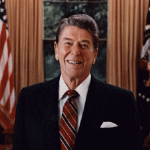 When a United States president is assassinated, it sends shock waves around the world. When one is shot and lives, it sends waves of shock too…and then relief. I was a little girl when John F Kennedy was shot and killed on November 22, 1963, and I will never forget where I was when I found out about it. At the tender age of just seven years, I don’t really think that I fully understood the gravity of the situation. When President Ronald Regan was shot in the chest, on March 30, 1981, I was a married twenty five year old mother of two daughters, and I fully understood the gravity of the situation, and how it could have affected our nation and the world. It was however, the reason he was shot that totally baffled me. I mean, I know what John Hinkley Jr’s deranged reasons were, but it still made no sense to me…especially that he would think that somehow he would win Jodie Foster’s love by shooting the president. I suppose that is simply how the deranged mind works.
When a United States president is assassinated, it sends shock waves around the world. When one is shot and lives, it sends waves of shock too…and then relief. I was a little girl when John F Kennedy was shot and killed on November 22, 1963, and I will never forget where I was when I found out about it. At the tender age of just seven years, I don’t really think that I fully understood the gravity of the situation. When President Ronald Regan was shot in the chest, on March 30, 1981, I was a married twenty five year old mother of two daughters, and I fully understood the gravity of the situation, and how it could have affected our nation and the world. It was however, the reason he was shot that totally baffled me. I mean, I know what John Hinkley Jr’s deranged reasons were, but it still made no sense to me…especially that he would think that somehow he would win Jodie Foster’s love by shooting the president. I suppose that is simply how the deranged mind works.
In the years that the United States has been a nation, sixteen assassination attempts on our presidents. Of those, there have been four successful Presidential assassinations. They were Lincoln, Garfield, McKinley, and Kennedy. I really never thought there might have been that many attempts, but I can see that people get distraut with how things are going, and if they are at all unstable, they might attempt to shoot the president.
President Reagan’s shooting was probably one of the most strange, because he appartently didn’t feel the .22 caliber bullet that entered his chest, narrowly missing his heart, and hit his lung. There were three attendants with him, who were also hit. They were White House Press Secretary James Brady, Secret Service agent Timothy McCarthy, and DC police officer Thomas Delahaney. Hinkley was then overpowered and pinned against a wall. Reagan was shoved into the car and taken to the hospital for treatment. He made a complete recovery, which was amazing, considering that he was 70 years old at the time. He even insisted on walking into George Washington University Hospital under his own power. He was in good spirits and visiting with his wife, Nancy while waiting for surgery. He laughingly said, ”Honey, I forgot to duck,” and to his surgeons, “Please tell me you’re Republicans.”
The next day, he resumed some of his executive duties and even signed a piece of legislation from his hospital bed. He returned to work at the White House on April 11, 1981. He returned even more popular that he already was, and received a hero’s welcome by Congress. His highly successful economics plan was passed with several Democrats breaking ranks to back his plan. Nevertheless, President Reagan felt the effects of the shooting for years afterward. The other men eventually recovered, but James Brady suffered permanent brain damage and later became an advocate for the “Brady Bill” requiring a five day waiting period and background checks before the purchase of a gun, which was signed into law by President Bill Clinton. John Hinkley received a verdict of “not guilty by reason of insanity” bringing with it outrage among the people of this nation. He has been incarcerated at Saint Elizabeth’s Hospital since that time, but more recently has been allowed supervised home visits with his parents. I suppose that one day, he could be released, since they have said that his mental illness is in remission.
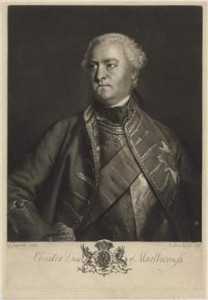 The dukedom of Marlborough is one of the titles in the Peerage of England. The Peerage of England comprises all peerages created in the Kingdom of England before the Act of Union in 1707. In that year, the Peerages of England and Scotland were replaced by one Peerage of Great Britain. The peerage is a legal system of largely hereditary titles in the United Kingdom, which is constituted by the ranks of British nobility and is part of the British honors system. The dukedom of Marlborough was created by Queen Anne in 1702, for John Churchill, who was the 1st Duke of Marlborough.
The dukedom of Marlborough is one of the titles in the Peerage of England. The Peerage of England comprises all peerages created in the Kingdom of England before the Act of Union in 1707. In that year, the Peerages of England and Scotland were replaced by one Peerage of Great Britain. The peerage is a legal system of largely hereditary titles in the United Kingdom, which is constituted by the ranks of British nobility and is part of the British honors system. The dukedom of Marlborough was created by Queen Anne in 1702, for John Churchill, who was the 1st Duke of Marlborough.
I can’t say that I completely understand all there is to about the peerage of Great Britain, but in the peerage, a Duke is a higher rank than a Marquess, Earl, Viscount and Baron. Thus Prince William is the Duke of Cambridge, because as the prince, it would not be right for him to have a lower rank than other members of the peerage. Originally dukes were the rulers of the provinces of the Roman Empire. Now however, the title of duke has become in almost all cases a nominal rank, without possession of an actual principality. The province that a duke was titled over, is known as a duchy. As I said, in modern times dukes aren’t really over a duchy, with the exception of Lancaster and Cornwall, both of which do include land and ownership. Lancaster belongs to Queen Elizabeth II and Cornwall to Prince Charles. The title of duke cannot normally be handed down to female heirs, but the Dukedom of Marlborough is the exception to that rule. It is one of the few titles that allows females to inherit the title, and the only current dukedom to do so.
In the Spencer family, there have been a number of titles, but it wasn’t until Charles Spencer, 3rd Earl of Sunderland, widowed following the death of his first wife, Arabella, daughter of Henry Cavendish, 2nd Duke of  Newcastle, married Anne Churchill, that the Dukedom of Marlborough first came to the Spencers. With this dukedom, Charles Spencer was first introduced to politics, making this alliance between Sunderland and Marlborough a very important one for Charles and his descendants. From his marriage to Anne Churchill who would become the 2nd Duke of Marlborough, the Spencer family would retain the dukedom for all time. At the current time, the dukedom is at 12, with Charles James Spencer-Churchill, 12th Duke of Marlborough, born in 1955, as the current duke.
Newcastle, married Anne Churchill, that the Dukedom of Marlborough first came to the Spencers. With this dukedom, Charles Spencer was first introduced to politics, making this alliance between Sunderland and Marlborough a very important one for Charles and his descendants. From his marriage to Anne Churchill who would become the 2nd Duke of Marlborough, the Spencer family would retain the dukedom for all time. At the current time, the dukedom is at 12, with Charles James Spencer-Churchill, 12th Duke of Marlborough, born in 1955, as the current duke.
To date, I cannot say how many dukes and duchesses were or are Spencer descendants, for names change with marriages over the years. Nevertheless, the Spencers have played a great part in the peerage of Great Britain, and with Prince William and his descendants, beginning with Prince George, the Spencers will continue to have great influence in that nation for the rest of time.
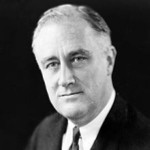
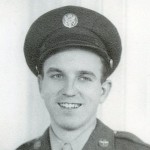 In the height of World War II, on January 14, 1943, President Franklin D Roosevelt made history when he became the first president to travel by airplane on official business. The trip was not without danger. The German U-boats were wreaking havoc on Allied war ships in the Atlantic, and it was decided that a face to face conference was needed to discuss strategy. The man President Roosevelt was going to see, was my fifteenth cousin once removed, Winston Spencer-Churchill. No American President had flown on official business before, but with security in the Atlantic uncertain, Roosevelt’s advisors reluctantly agreed that he should fly. I’m sure his frail health at 60 years of age played a part in their decision too. The secret trip began on January 11, and the plane had to make several stops along the way. They took off from Florida with a first stop in the Caribbean to refuel and allow the president to rest. They then took off and headed south along the South American coast to Brazil, then across the Atlantic to Gambia, finally reaching Casablanca on this day, January 14, 1943.
In the height of World War II, on January 14, 1943, President Franklin D Roosevelt made history when he became the first president to travel by airplane on official business. The trip was not without danger. The German U-boats were wreaking havoc on Allied war ships in the Atlantic, and it was decided that a face to face conference was needed to discuss strategy. The man President Roosevelt was going to see, was my fifteenth cousin once removed, Winston Spencer-Churchill. No American President had flown on official business before, but with security in the Atlantic uncertain, Roosevelt’s advisors reluctantly agreed that he should fly. I’m sure his frail health at 60 years of age played a part in their decision too. The secret trip began on January 11, and the plane had to make several stops along the way. They took off from Florida with a first stop in the Caribbean to refuel and allow the president to rest. They then took off and headed south along the South American coast to Brazil, then across the Atlantic to Gambia, finally reaching Casablanca on this day, January 14, 1943.
It seems strange to us now that they would take such a roundabout route, but things were different then. The Boeing 314 Flying Boat that had been dubbed the Dixie Clipper was a big heavy plane. It had a flight range of 3,500 miles, and the direct route would have been about 4326 miles, making at lease one stop necessary. Since the Secret Service considered air travel for a president as risky anyway, I’m sure they wanted to take a 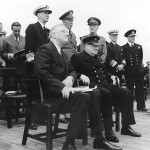 route that would keep them as far away from any fighting as they could. Also, the final leg of the trip required that the group transfer to an Army transport plane. The C-54 was required to fly at 15,000 feet to cross the Atlas Mountains…an altitude that seems insignificant today, but must have been quite high then. The Secret Service personnel and FDR’s advisors were worried about the oxygen levels affecting the president, and in the end, he did have to go on oxygen for a time during that part of the flight.
route that would keep them as far away from any fighting as they could. Also, the final leg of the trip required that the group transfer to an Army transport plane. The C-54 was required to fly at 15,000 feet to cross the Atlas Mountains…an altitude that seems insignificant today, but must have been quite high then. The Secret Service personnel and FDR’s advisors were worried about the oxygen levels affecting the president, and in the end, he did have to go on oxygen for a time during that part of the flight.
The flight was mastered successfully, and the two men were safely tucked into the Anfa Hotel where Roosevelt and Churchill were both in suites that were close together, making it the perfect place for the conference to take place…after the rooms were cleared of listening devises that had been planted by unknown persons, that is. The advisors and chiefs of staff did most of the hard work of the negotiations, but the presence of Roosevelt and Churchill kept them on task and working toward an agreement. The conference was very important to both sides, as the British were being hit very hard, and Roosevelt needed to keep the American troops advancing and winning their battles, so he could demonstrate to the American people that the tide of this war was turning. People get weary of war quite quickly, and in order to keep their support, victory in battle is key.
The Casablanca Conference was looked at by some as a victory for the British negotiators, because Churchill’s strategy prevailed, but they had missed the fact that the Americans also gained British commitments to long-term goals that went beyond the immediate objectives in the Mediterranean. The Americans agreed to attack Sicily after the victory in North Africa and the British agreed to allow a massive buildup of Allied Forces in 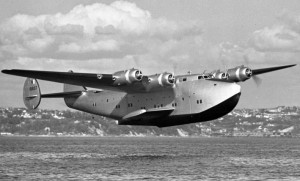 Britain, which would allow for an invasion of France with a target date of May 1, 1944. The invasion actually took place on June 6, 1944, and would become a day we all know as D-Day, when the troops stormed the beaches of Normandy…and that is where my dad came in. Since he was one of the Allied Forces that was stationed in England, his B-17G Bomber was one of those that provided cover for that invasion. It seems quite strange to me that a conference that took place over a year before, and 2 months prior to my dad’s enlistment, would ultimately place him in a position to fight in one of the most well known battles of World War II.
Britain, which would allow for an invasion of France with a target date of May 1, 1944. The invasion actually took place on June 6, 1944, and would become a day we all know as D-Day, when the troops stormed the beaches of Normandy…and that is where my dad came in. Since he was one of the Allied Forces that was stationed in England, his B-17G Bomber was one of those that provided cover for that invasion. It seems quite strange to me that a conference that took place over a year before, and 2 months prior to my dad’s enlistment, would ultimately place him in a position to fight in one of the most well known battles of World War II.
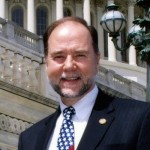 For the past several weeks, I have been exchanging emails and lots of information with a man named John B Knox. He is my husband, Bob Schulenberg’s sixth cousin once removed. I came across his website about a year or so ago, but it wasn’t until recently that I decided to contact him. This was such a great decision on my part, because it has been an interesting journey. Because John had the last name of Knox, and some of the same relatives that I knew to be in the Knox line of my mother-in-law’s family, I had no doubt in my mind that we are related, but I didn’t know the exact relationship. Finding someone who is a descendant of an aunt or uncle back in the 1800s and especially beyond that, isn’t as easy as one might think. It is very helpful when you find someone who has researched their family history as well as John has, because the research is more that half done. It was easy for John to connect our two lines and tell me exactly what the connection was. John is a very thorough person too, so he was able to send me an easy to follow diagram of the connection. Now, my family tree shows the connection to John and his family in detail.
For the past several weeks, I have been exchanging emails and lots of information with a man named John B Knox. He is my husband, Bob Schulenberg’s sixth cousin once removed. I came across his website about a year or so ago, but it wasn’t until recently that I decided to contact him. This was such a great decision on my part, because it has been an interesting journey. Because John had the last name of Knox, and some of the same relatives that I knew to be in the Knox line of my mother-in-law’s family, I had no doubt in my mind that we are related, but I didn’t know the exact relationship. Finding someone who is a descendant of an aunt or uncle back in the 1800s and especially beyond that, isn’t as easy as one might think. It is very helpful when you find someone who has researched their family history as well as John has, because the research is more that half done. It was easy for John to connect our two lines and tell me exactly what the connection was. John is a very thorough person too, so he was able to send me an easy to follow diagram of the connection. Now, my family tree shows the connection to John and his family in detail.
Getting to know John has been a lot of fun. He was born in Kentucky, but he and his family now live in Washington DC. I could try to summarize his career, but I think he says it best so I will quote it instead. According to John’s LinkedIn page, “I currently serve as a Congressional Liaison for the Defense Intelligence Agency (DIA). My background includes two decades+ of experience in management, strategic planning, change management, international business development, customer relations and team building. Highlights include my seven years as NASA’s Manager of Video Applications. The 35-member team that I led, using the world class production facilities that my team designed and built, won 44 awards on behalf of the space agency, including four Emmy’s. That record at NASA remains unmatched. I co-chaired the agency-wide Standards Committee for High Definition Television at NASA which established technical guidelines for the space agency’s transition to HDTV. Today, the guidelines which my group developed, continues to insure the interoperability of communications between each of NASA’s ten world-class research centers and the International Space Station. While serving as the DIA’s Contracting Office Manager in Baghdad, Iraq, I oversaw a “ground-up” conversion of twelve Iraqi buildings for use as DIA’s in-country Headquarters, Annex and billeting for deployed U.S. personnel. For this project, I was awarded DIA’s Civilian Combat Support Award. Most recently, I drafted, proposed and am currently leading the implementation the first Congressional Communications Strategic Plan for DIA. I hold a Bachelor’s Degree in Communications Technology, a Master’s Degree in Media Management (Magna Cum Laude graduate) and a Master Of Business Administration (MBA) Degree with a concentration in management.” All I could say to that was…”Wow!!”
This, of course, lets me know that I really knew nothing of the person, that I had so boldly contacted, and who so graciously contacted me back, and has helped me immensely with my inquiries. I have always known that the Knox family has been heavily into politics, and other areas of government work, and this Knox family member has obviously followed in the footsteps of his ancestors. I can’t say that I’m disappointed in that. I also know that his work at NASA interests me as well. I’m sure he would not have brought all this up to me on his own, because he never made the conversations we had about himself, but rather about the family history, and our connection to it. I think he is probably a humble man, and only put the information I gave here on LinkedIn, because that is what he was supposed to do on LinkedIn. Nevertheless, I must say that I am impressed with all he has done, and excited to know him and to get to know his family as wall. John and his wife Lisa have two daughters, Lindsey and Kelly. I am excited about this new branch of my family history, and I look forward to getting to know this family even better.
 Sometimes we think we know the whole story, and other times, we are pretty sure we don’t know the story at all. For me, the attack of Pearl Harbor is one that has seemed somewhat fuzzy. I mean I know that the Japanese attacked Pearl Harbor without warning on December the 7th of 1941…but why exactly. I have to wonder if I am the only one who isn’t exactly sure why my dad had to go to war in March of 1943 at the age of 18 years, along with several uncles. I know that his family knew that it was coming, and they were dreading it very much, but it was inevitable. We had been attacked. We must retaliate when we are attacked!! I understood that…but why were we attacked, and was it without provocation?
Sometimes we think we know the whole story, and other times, we are pretty sure we don’t know the story at all. For me, the attack of Pearl Harbor is one that has seemed somewhat fuzzy. I mean I know that the Japanese attacked Pearl Harbor without warning on December the 7th of 1941…but why exactly. I have to wonder if I am the only one who isn’t exactly sure why my dad had to go to war in March of 1943 at the age of 18 years, along with several uncles. I know that his family knew that it was coming, and they were dreading it very much, but it was inevitable. We had been attacked. We must retaliate when we are attacked!! I understood that…but why were we attacked, and was it without provocation?
Then I came across something that happened on Dec 1, 1941. This was the day that the Japanese made the decision to attack Pearl Harbor. This had been a possibility since the 1920s, but in 1931, with the Japanese invasion of Manchuria things got really tense. Japan was insistent on invading other countries, and were slowly moving into China. Beginning in 1938, the United States adopted increasingly tighter trade restrictions with Japan. Nevertheless, Japan would not be deterred from its expansionist policies, or from signing the Tripartite Pact in 1940 with Nazi Germany and Fascist Italy, officially forming the Axis Powers. In 1940, Japan invaded French Indochina so they could embargo all imports into China including war supplies from the United States. Some of these facts I knew, and some I didn’t. This is, of course, a very shortened version, but you can see that Japan was becoming increasingly more dangerous to the world, and to everyone in it.
On November 7, 1941, Secretary of State, Cordell Hull warned President Franklin Roosevelt’s cabinet that an 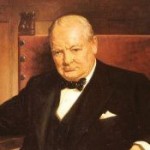 attack on the United States by Japan could happen at any time…without warning. On November 9th, Winston Churchill, who is my 15th cousin once removed, told the United States that if we went to war with Japan, the British Empire would declare war on Japan “within the hour.” It was a heavy responsibility for the United States, and for Secretary of State Hull. Nevertheless, something had to be done, and the world was looking to the United States to make the first move.
attack on the United States by Japan could happen at any time…without warning. On November 9th, Winston Churchill, who is my 15th cousin once removed, told the United States that if we went to war with Japan, the British Empire would declare war on Japan “within the hour.” It was a heavy responsibility for the United States, and for Secretary of State Hull. Nevertheless, something had to be done, and the world was looking to the United States to make the first move.
The decision to go to war is a difficult one, and one that I do not believe any civilized nation takes lightly. I’m sure that is why so many presidents have tried every possible restriction against some of the crazy dictators in this world. The problem is that so many of those dictators are not moved from their agendas…no matter what. Secretary of State Hull decided to try one more time, and so he wrote the Hull Note on November 26, 1941, which outlined ten proposals, some of which matched earlier Japanese proposals, but of others, Hull knew meant he was basically declaring war on Japan. The agreement would have to be made by November 29, and of course, history tells us that Japan did not agree. While Australia tried an offer to act as mediator between the United States and Japan on November 29th, they were told that the opportunity to settle this was past. On December 1, 1941, Japan’s Emperor Hirohito declared war against the United States, Britain, and the Netherlands, after rejecting the demands of the United States in the Hull Note, which the Japanese later dubbed The Hull Ultimatum, as a way of making the United States look like they were to blame for all this.
It was this action…on this day in history, and the events leading up to this action, and those that would follow, including the attack on Pearl Harbor on December 7, 1941 that drew the United States and our allies into World War II, and that would ultimately bring about my dad’s part in that war…as well as the part played by so many others, including a number of my uncles. War is a horrible event, and one that I truly don’t believe anyone 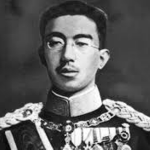 wants to be a part of, but sometimes it is inevitable. When a nation, such as Japan decides to take over the world…one weaker country at a time, someone has to step up and put a stop to it. Unfortunately, history has placed that responsibility in the hands of the United States many times. There are people who think we should just stay out of it, but if we did, just how long would it be before that nation came after us, because we appeared weak too. We might be able to fight them off…unless we have allowed our military might to be reduced to a point of making us as weak as some of these other nations. If we couldn’t fight them off, then our nation would lose it’s many freedoms, and we would find ourselves living under a dictator too. While I hate war too, I am not willing to lose the freedoms our military personnel have fought so hard for…are you?
wants to be a part of, but sometimes it is inevitable. When a nation, such as Japan decides to take over the world…one weaker country at a time, someone has to step up and put a stop to it. Unfortunately, history has placed that responsibility in the hands of the United States many times. There are people who think we should just stay out of it, but if we did, just how long would it be before that nation came after us, because we appeared weak too. We might be able to fight them off…unless we have allowed our military might to be reduced to a point of making us as weak as some of these other nations. If we couldn’t fight them off, then our nation would lose it’s many freedoms, and we would find ourselves living under a dictator too. While I hate war too, I am not willing to lose the freedoms our military personnel have fought so hard for…are you?

